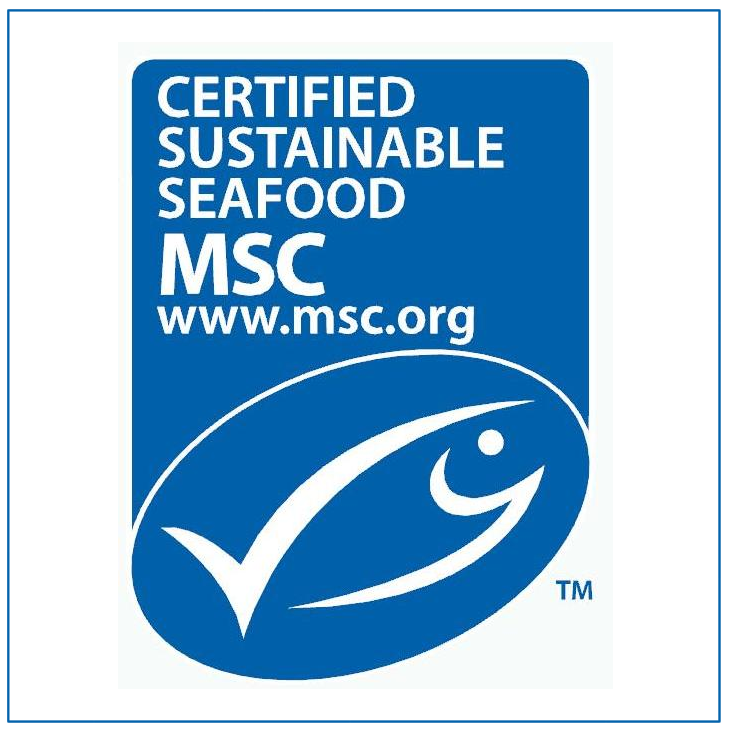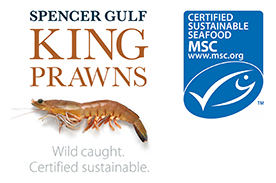The Marine Stewardship Council (MSC)
What is the MSC?

The MSC operates a certification and ecolabel program based on a scientifically robust standard for assessing whether wild-capture fisheries are ecologically sustainable and well-managed. Fish products from fisheries that meet the MSC’s standard are eligible to use the MSC’s blueecolabel or otherwise make a claim that they are MSC-certified.
The MSC’s mission is to use this certification and ecolabel program to contribute to the health of the world’s oceans by recognizing and rewarding sustainable fishing practices, influencing the choices people make when buying seafood and working with our partners to transform the seafood market to a sustainable basis.
We work collaboratively with the fishing industry, seafood business sector, governments, scientific community, environmental groups and others to give retailers, restaurants and consumers an opportunity to choose and reward sustainable fishing through their seafood purchasing choices.
For more information visit the MSC website.
The MSC Certification
With the growing consumer and supply chain demands for sustainably sourced seafood here in Australia and worldwide, the independent certification of the sustainability of a fishery’s operations has an increasingly important role to play in assuring markets the seafood they are providing, and eating, does in fact come from a sustainable fishery.
The MSC standard allows fisheries to be assessed – by independent certification bodies – against rigorous and science based criteria, and was established in consultation with international conservation and fisheries management stakeholders. We believe the MSC standard is the bench mark for sustainable fisheries management, and provides a market and education requirement that has not been, and possibly cannot be, effectively met by fisheries management or industry at this point in time.
View the Spencer Gulf & West Coast Prawn Association’s MSC Certificate (2012).
Kings of Sustainability
The Spencer Gulf King Prawn Fishery sailed into the history books with a series of firsts in sustainability in November 2011. Represented by the Spencer Gulf and West Coast Prawn Association (SGWCPA), this fishery is the first prawn fishery in the Asia Pacific, and the first king prawn fishery in the world, to gain the prestigious Marine Stewardship Council (MSC) certification for sustainability.
Although the full assessment of the fishery took a little over 12 months, it took longer to make the decisions to invest in the process. Having the support of the World Wildlife Fund to undertake the assessment was a vote of confidence that saw the fishery put its hat in the ring, after a long time of deliberation.
Why the MSC?
The Association chose the MSC certification programme as a route to demonstrating its sustainability because the standard is demanding and the thresholds high. One only needs to view the MSC’s website to see that they don’t let just anyone fly their blue standard and the Spencer Gulf King Prawns successfully went through their rigorous testing and review. To view the flow chart of the assessment and certification process click here.
The fishermen have a great product and were very keen to see Spencer Gulf King Prawns recognised not only as high quality product, but an ecologically sustainable product. The fishermen in the Spencer Gulf king prawn fishery are very proud of their achievement over the years. There have been some hard decisions to make on the road to becoming a sustainable fishery and MSC certification is recognition of the years of hard work.
Achieving MSC certification in a co-managed fishery indicates the maturity and healthy nature of the fishery to progress further co-management options. It also provides entry into growing and fastidious markets that only source their product from sustainably certified industries.
Effective management the key to certification
All over the world people are looking to source their food from sustainable supplies. MSC certification is recognition of the first-rate management practices in place at the Spencer Gulf King Prawn Fishery, which include effort restrictions, closed fishing periods, closed areas and harvest strategies to regulate the total catch.
WWF (Australia and US) actively supported the assessment of the fishery by acting as a co-client with the SGWCPA and providing technical and financial assistance throughout the process.
The SGWCPA has addressed many biological, ecological, and economic challenges over the last 40 years, and have created one of the best models for sustainable prawn fishing.
A Sustainable Future
The Spencer Gulf King Prawn fishery did not need to make any major adjustments to its practices in order to meet certification. The fishery has imposed a size limit on a by-product species (Balmain Bugs), to ensure their sustainability. The fishery will need to continue to work on managing, understanding and assessing by-catch. This will include completing a by-catch risk assessment, as required by the Fisheries Management Act 2007, and will be used to improve and focus data collection and analysis. The fishery will also continue to explore the development of by-catch reduction devices.
As part of gaining MSC certification, a number of conditions were placed on the fishery. These conditions need to be met if the certification is to be continued and their progress will be assessed through the annual MSC audit of our operations. A plan is being developed to meet those conditions. Most of the conditions aligned with future strategies. For example the conditions include improving SGKP fishery’s understanding of syngnathids and their habitats. Although the fishery has placed self-imposed closures to minimise the impacts of fishing on these species based on fishermen’s knowledge, the fishery now needs to assess that these management controls are being effective.
The fishery will continue to seek out and use the best practices to secure future prawn stocks, and therefore future livelihoods, are sustained throughout the region.
